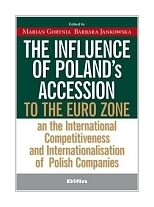The influence of Polands accession to the euro zone at the International
Competitiveness and Internationalisation of Polish Companies
The book is the result of a research project funded by a grant from Poland’s Ministry
of Science and Higher Education. The name of the project was “The influence of
Poland’s accession to the euro zone on the international competitiveness and
internationalisation of Polish companies” (N N115 257136). The project was carried out
in 2009-2010 by a research team consisting of Marian Gorynia (project leader); Barbara
Jankowska, Maciej Pietrzykowski, Piotr Tarka and Marlena Dzikowska.
The main reason for conducting the study was to contribute to and enrich the debate
over Poland’s accession to the euro zone. The debate is characterised by a clear focus
on macroeconomic issues. This is perfectly understandable and justified. What seems less
understandable and justified is the virtual absence of reflection or in-depth research on
the microeconomic determinants of the currency integration process. “Translating” the
macroeconomic and regulatory determinants of corporate behaviour into companies’ actual
activities may be different than expected. Companies’ actual reactions to macroeconomic
factors and to the economic-policy instruments applied may differ from popular models,
mechanisms and stereotypes.
Realising that managers’ perception of a future business world has numerous
limitations, the authors of the present study do not intend to make absolute the results
of their research. It seems, however, that the results presented here could serve as a
valuable supplement to studies which adopt an entirely different perspective.
The present study focuses on the influence of joining the euro zone on corporate
competitiveness. For, in actual fact, an answer to the question about whether or not it is
worthwhile or advisable to join the euro boils down to assessing the influence of
accession on companies’ competitiveness. If entering the euro zone boosts Polish
companies’ competitiveness, it will mean that Operation Euro made sense from the
economic point of view.
CONTENTS
INTRODUCTION
Marian Gorynia, Barbara Jankowska, Maciej Pietrzykowski
Chapter 1
THE THEORETICAL AND CONCEPTUAL PART
1. Basic concepts of company competitiveness
Marian Gorynia, Barbara Jankowska, Piotr Tarka
1.1. Competition as a basic concept for competitiveness
1.2. The essence of competitiveness
1.3. Definitions of company competitiveness
1.4. Classifications of company competitiveness
1.5. Dimensions of company competitiveness – an attempt at conceptualization and
operationalisation
1.5.1. Competitive position
1.5.2. Competitive potential
1.5.3. Competitive strategy
1.5.4. Competitive advantage
1.6. International competitiveness and company internationalisation
2. The main concepts of company internationalization
Marian Gorynia, Barbara Jankowska
2.1. Models of internationalisation
2.2.1. The sequential (conventional, traditional, evolutionary) model
2.1.2. Unconventional internationalisation and simultaneous internationalisation
2.1.3. Internationalisation from the viewpoint of the network approach
2.2. Measuring internationalisation
3. Currency and monetary union and the operation of the euro zone as determinants
of company competitiveness
Marlena Dzikowska, Maciej Pietrzykowski
3.1. Theoretical foundations of Economic and Monetary Union
3.1.1. Monetary union as a form of international economic integration
3.1.2. The optimum currency area theory
3.1.3. The construction and workings of the monetary union in EU member states
3.2. The operation of Economic and Monetary Union and Poland’s position
3.2.1. Differences in the levels of economic development
3.2.2. Nominal, real and legal convergence
3.2.3. The mobility of production factors and labour market flexibility
3.2.4. Economies’ openness
3.2.5. The diversification of production and the level of intra-industry trade
3.2.6. Business-cycle synchronisation
3.2.7. The problem of asymmetric shocks
3.2.8. Monetary and fiscal policy under monetary union
3.3. The euro zone as an optimum currency area
4. An analytical scheme of the influence of Poland’s accession to the euro zone
on the international competitiveness and internationalisation of Polish companies
Marian Gorynia, Barbara Jankowska
4.1. An analytical scheme as a research tool
4.2. An analytical scheme of the influence of joining the euro on the international
competitiveness and internationalisation of Polish companies
4.3. Poland’s accession to the euro zone – implications for the international
competitiveness and internationalisation of Polish companies – a deductive and
literature-based approach
4.4. The influence of Poland’s accession to the euro zone on the international
competitiveness and internationalisation of Polish companies – exploratory research
4.4.1. The methodology, assumptions, characteristics and method of data analysis
4.4.2. Characteristics of the sample under study
4.4.3. The influence of Poland’s accession to the euro zone on Polish companies’
competitive potential
4.4.4. The influence of Poland’s accession to the euro zone on Polish companies’
competitive strategy
4.4.5. The influence of Poland’s accession to the euro zone on Polish companies’
competitive position
4.4.6. The influence of Poland’s accession to the euro zone on the internationalisation
of Polish companies
4.5. Accession to the euro zone and Polish companies’ competitiveness and
internationalisation – the current state of knowledge and exploratory research results
– an attempt at confrontation
Chapter 2
THE EMPIRICAL PART
1. The research methodology
Piotr Tarka
1.1. The sample-selection process
1.2. The characteristics and assumptions of the study
1.3. Operational criteria for the study (coordinators’ and interviewers’ work in
spatial terms)
1.4. Assumed data analysis criteria and methods
2. Empirical research results
Marlena Dzikowska, Marian Gorynia, Barbara Jankowska Maciej Pietrzykowski, Piotr Tarka
2.1. Characteristics of the sample investigated
2.2. The benefits and risks associated with Poland’s accession to the euro zone
2.3. Poland’s accession to the euro zone and the international competitiveness of the
companies surveyed
2.4. Poland’s accession to the euro zone and company internationalisation
2.5. Euro-sceptics, euro-neutrals and euro-enthusiasts – survey respondents
2.6. A summary of the research results
Chapter 3
THE PRESCRIPTIVE PART
1. Introduction
Marian Gorynia
2. Recommendations for companies
Marlena Dzikowska, Marian Gorynia, Barbara Jankowska
2.1. General recommendations
2.2. Detailed recommendations
3. Recommendations for economic self-government
Marian Gorynia, Barbara Jankowska
3.1. Economic self-government as a market economy institution
3.2. Forms of economic self-government and its role in increasing competitiveness
4. Implications for economic policy
Marian Gorynia, Barbara Jankowska, Maciej Pietrzykowski
4.1. General recommendations
4.2. Specific recommendations related to the introduction of the euro
5. Suggestions for further research
Marian Gorynia
BIBLIOGRAPHY
LISTS OF CHARTS, FIGURES, TABLES
240 pages, Paperback


